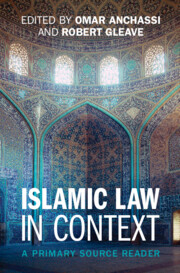Book contents
- Islamic Law in Context
- Islamic Law in Context
- Copyright page
- Contents
- Acknowledgements
- Contributors
- Introduction
- Part I Islamic Legal Theory (Uṣūl al-Fiqh) and Related Genres
- Part II Islamic Jurisprudence (Fiqh) and Related Genres
- Part III Legal Opinions (Fatwās)
- Part IV Court Judgments and Other Court Documentation
- Part V Judicial Manuals and Reference Books
- Chapter 31 Introduction to Part V
- Chapter 32 ‘The Discretion of the İmâm’
- Chapter 33 On Criminal Law
- Chapter 34 Custody Disputes and the Best Interests of the Child, from al-Murshid fī l-Qaḍāʾ al-Sharʿī (2008) by Qāḍī Iyad Zahalka
- Chapter 35 Ibn Khunayn (b. 1376/1956) on Adjudication and Judicial Organisation, from al-Kāshif fī Sharḥ Niẓām al-Murāfaʿāt al-Sharʿiyya al-Saʿūdī
- Chapter 36 Temporary Marriage in Iranian Family Law
- Chapter 37 On Scriptuaries and Pagans as Slave-Concubines
- Part VI Alternative Sources for Islamic Legal Studies
- Name Index
- Subject Index
- References
Chapter 31 - Introduction to Part V
from Part V - Judicial Manuals and Reference Books
Published online by Cambridge University Press: 14 November 2024
- Islamic Law in Context
- Islamic Law in Context
- Copyright page
- Contents
- Acknowledgements
- Contributors
- Introduction
- Part I Islamic Legal Theory (Uṣūl al-Fiqh) and Related Genres
- Part II Islamic Jurisprudence (Fiqh) and Related Genres
- Part III Legal Opinions (Fatwās)
- Part IV Court Judgments and Other Court Documentation
- Part V Judicial Manuals and Reference Books
- Chapter 31 Introduction to Part V
- Chapter 32 ‘The Discretion of the İmâm’
- Chapter 33 On Criminal Law
- Chapter 34 Custody Disputes and the Best Interests of the Child, from al-Murshid fī l-Qaḍāʾ al-Sharʿī (2008) by Qāḍī Iyad Zahalka
- Chapter 35 Ibn Khunayn (b. 1376/1956) on Adjudication and Judicial Organisation, from al-Kāshif fī Sharḥ Niẓām al-Murāfaʿāt al-Sharʿiyya al-Saʿūdī
- Chapter 36 Temporary Marriage in Iranian Family Law
- Chapter 37 On Scriptuaries and Pagans as Slave-Concubines
- Part VI Alternative Sources for Islamic Legal Studies
- Name Index
- Subject Index
- References
Summary
This introduction to Section 5 of the volume on judicial manuals and handbooks discusses the portrayal of Islamic legal judgeship (qaḍāʾ) in existing scholarship and comments on the transformation of the institution in the modern period with the rise of the nation-state and the tendency toward the codification of law, as well as including a representative bibliography of recent scholarship on the subject.
- Type
- Chapter
- Information
- Islamic Law in ContextA Primary Source Reader, pp. 335 - 337Publisher: Cambridge University PressPrint publication year: 2024

